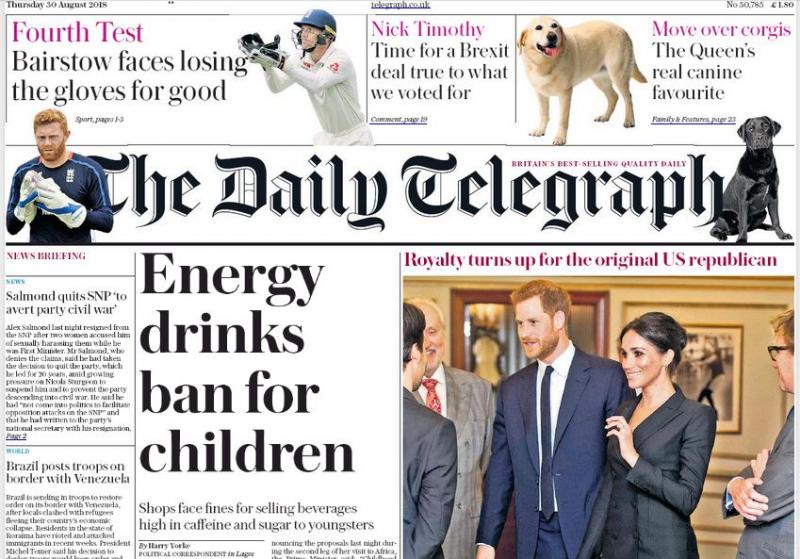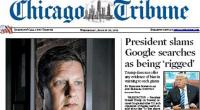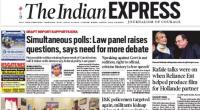 Children will be banned from buying energy drinks under plans announced by Theresa May to tackle disruptive behaviour in classrooms.
Children will be banned from buying energy drinks under plans announced by Theresa May to tackle disruptive behaviour in classrooms.
The sale of highly caffeinated sugary brands such as Red Bull and Monster could be prohibited up to the age of 18.
Shops that flout the proposed ban would face a fine of up to £2,500, the same as the penalty for selling cigarettes to children. Ministers are also considering banning their sale from vending machines.
There is growing concern that the drinks are causing hyperactivity in children, while the Department for Health has warned that “excessive consumption” is associated with a “catalogue of health issues” including headaches, sleeping problems and stomach aches.
Sold for as little as 25p each, cans of popular brands can contain up to twice the amount of caffeine as an average cup of coffee and 60 per cent more calories.
Most contain up to 10 teaspoons of sugar – more than an adult should consume in a whole day – leading to concerns that they are also fuelling childhood obesity.
One in four children aged between six and nine regularly consumes energy drinks, with the proportion rising to two in three for children aged between 10 and 18. Separate research has found that British children consume 50 per cent more energy drinks than their European counterparts. An- nouncing the proposals last night during the second leg of her visit to Africa, the Prime Minister said: “Childhood obesity is one of the greatest health challenges this country faces, and that’s why we are taking significant action to reduce the amounts of sugar consumed by young people and to help families make healthier choices.
“With thousands of young people regularly consuming energy drinks, often because they are sold at cheaper prices than soft drinks, we will consult on banning [their] sale to children. It is vital that we do all we can to make sure children have the best start in life.”
Steve Brine, the health minister, said the ban was necessary to “protect children from products that are damaging their health and education”, adding that there were proven and “worrying” links between the drinks and poor behaviour.
However, the proposals are likely cause upset among Conservative backbench MPS, some of whom believe banning such items is a denial of choice and argue that parents must take more responsibility for their children’s welfare.
One senior minister, who wished to remain anonymous, said that government policy was in danger of being reduced to “a ban a day”, adding: “Every day, something else is banned. It’s just so depressing.”
Downing Street last night made clear that any product that contained more than 150mg of caffeine per litre would be banned for children. The Government will consult on whether the age limit should be 18 or 16.
Although some major retailers have taken the decision to ban the sale of energy drinks to children, many have not and just a fifth of grocers and corner shops have made the move voluntarily.
It will come as a blow to some of the country’s leading drinks brands, such as Red Bull and Monster Energy, both of which far exceed the proposed limit.
Last night, Jamie Oliver, the TV chef and anti-sugar campaigner, praised Mrs May over the announcement, adding that it was the “right thing to do”.
He said: “Teachers from across the country have told me how their lessons are disrupted in classrooms because of these drinks, packed with stimulant.
“The energy drinks industry has never thought these products were suitable for children.
“They even say ‘not for children’ on the labels. The sale to kids should be stopped as soon as possible.” The move was also hailed by Duncan Selbie, the chief executive of Public Health England, who said that energy drinks nutritionally offered “nothing more than unnecessary sugar”.
He added: “Restricting the sale of these drinks is another bold step needed to turn the tide on childhood obesity.”
Prof Russell Viner, president of the Royal College of Paediatrics and Child Health, said there was no evidence to show that the drinks had “any nutritional value or place in the diet of children and young people.
“The growing market for energy drinks and potential for harm to children and young people clearly warrants further scrutiny. That’s why we’re pleased to see the Government take action on this and other measures to tackle childhood obesity and improve children’s health.”
The consultation will begin today and run for 12 weeks.
 Leads Of The World
Leads Of The World
31041 hour(s) 12 minute(s) ago ;
Morning 04:06 ; Thursday ; May 02, 2024
The Daily TelegraphEnergy drinks ban for children
Send
Bangla Tribune Desk
Published : 22:32, Aug 30, 2018 | Updated : 22:34, Aug 30, 2018
Published : 22:32, Aug 30, 2018 | Updated : 22:34, Aug 30, 2018
0 ...0 ...
/hb/
Topics: Top Stories
- KOICA donates medical supplies to BSMMU
- 5 more flights to take back British nationals to London
- Covid19: Rajarbagh, Mohammadpur worst affected
- Momen joins UN solidarity song over COVID-19 combat
- Covid-19: OIC to hold special meeting
- WFP begins food distribution in Cox’s Bazar
- WFP begins food distribution in Cox’s Bazar
- 290 return home to Australia
- Third charter flight for US citizens to return home
- Dhaka proposes to postpone D8 Summit
Unauthorized use of news, image, information, etc published by Bangla Tribune is punishable by copyright law. Appropriate legal steps will be taken by the management against any person or body that infringes those laws.
Bangla Tribune is one of the most revered online newspapers in Bangladesh, due to its reputation of neutral coverage and incisive analysis.
F R Tower, 8/C Panthapath, Shukrabad, Dhaka-1207 | Phone: 58151324; 58151326, Fax: 58151329 | Mob: 01730794527, 01730794528


